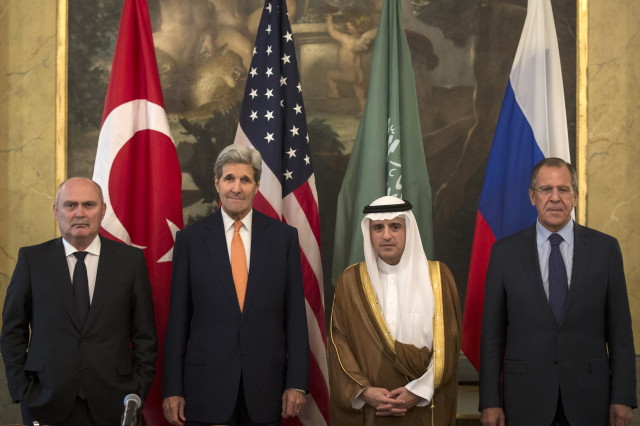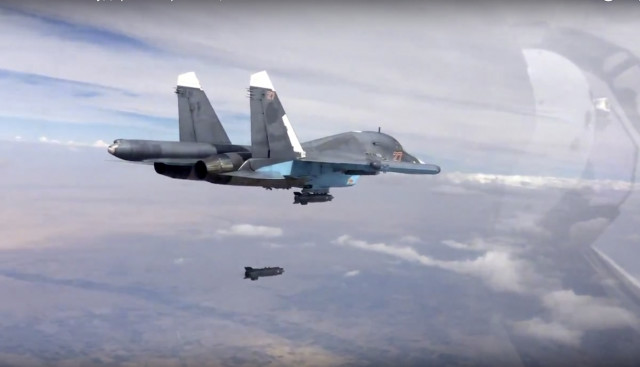U.S. is Driving Mideast Allies Toward Putin
Josh Rogin & Eli Lake – Bloomberg View
America’s traditional Middle East allies, having run out of patience with President Barack Obama’s policy in Syria, are now reaching out to a resurgent Russia — even though it is bolstering the very dictator so many of them have pushed to leave power.
Some in Washington see the new ties as a threat to U.S. interests, especially because the U.S. has worked since the 1970s to keep Russian influence out of the Middle East. But the Obama administration sees an opportunity.
Turkish Foreign Minister Feridun Sinirlioglu (L), U.S. Secretary of State John Kerry (2nd L), Saudi Foreign Minister Adel al-Jubeir (3rd L) and Russian Foreign Minister Sergey Lavrov pose during a photo opportunity before a meeting in Vienna, October 23, 2015. (REUTERS)
The State Department is now quietly encouraging U.S. allies to engage with Moscow, as part of Secretary John Kerry’s quest to win Russian support for a political process in Syria.
The Perils of a New Cold War
Dimitri Simes in an interview with the Council on Foreign Relations
[T]here is an interesting element in Putin’s gamble: namely, his diplomatic approaches to the United States to coordinate targets and to talk about a possible transition government in Syria. And they kind of are disappointed, indeed taken aback, that after they demonstrated their strength and determination, they’re still not invited to sit at the same table with the United States and its allies.
Their hope was that after this kind of daring, bold move, they would be invited to a diplomatic dialogue. And now that it’s not happening, they’re somewhat at a loss. I hear an element of frustration and confusion in Moscow on how to deal with this situation.
Why Putin’s Syria Gambit Aims at Something Bigger Than Syria
Dimitri Trenin – Tablet
A quarter-century after its withdrawal from Afghanistan, Russia is again at war in a Muslim country outside of the perimeter of its historical empire. Moscow’s intervention in Syria, however, is very different from its past uses of military power, marked by overland invasions and occupations. It is also happening in a regional environment which is new: a Middle East where outside powers, including the United States, are playing a much less dominant role than ever in the last 100 years; and non-state actors like IS are threatening to upend the system of states created after the fall of the Ottoman Empire.
Russian Su-34 strike fighter drops a bomb over Syria October 9, 2015. (Russian Defense Ministry Press Service via AP)
Moscow’s intervention is as much about Washington as it is about IS. Starting with Ukraine in 2014, Russia has broken out from the post-Cold War order dominated by the United States. In Eastern Europe, the Kremlin was insisting on its right to a sphere of privileged interests in what it terms as “the Russian world” and a security buffer between Russia and NATO. In the Middle East, it is claiming the right to co-equality with the Americans in fighting terrorism and managing regional security. To press both demands, Putin has used military force, and did it in novel ways. In Donbass, Russia engaged in a “hybrid war,” and in Syria it has employed its air and sea power.



